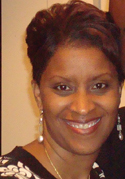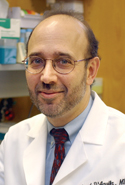
Jacqueline Fleming Hampton, Ph.D.
Clergy, scientists explore AIDS answers

Richard D'Aquila, M.D.
Clergy from African-American churches and researchers from across the country met in Nashville last week to discuss ways to stop the march of AIDS through the black community.
The two-day conference, called “Building Bridges,” was hosted by the Vanderbilt-Meharry Center for AIDS Research (CFAR) and the Center for AIDS Health Disparities Research at Meharry Medical College.
“We're getting better with our science. What troubles me is I have a 9-year-old son who's growing up in a world where African-Americans are becoming increasingly devastated by the (AIDS) virus,” said Jacqueline Fleming Hampton, Ph.D., director of Community Outreach for the Meharry center and one of the conference organizers.
“Enough is enough,” Hampton said, in opening Wednesday's session at the Scarritt-Bennett Center a block east of the Vanderbilt campus. “We've got to do something different.”
Although African Americans make up about 13 percent of the U.S. population, they accounted for nearly half of the new diagnoses of HIV/AIDS in 2006, according to the Centers for Disease Control and Prevention.
About 65 percent of all women infected with the human immunodeficiency virus are African-American.
Richard D'Aquila, M.D., director of the Vanderbilt-Meharry CFAR, urged participants “to innovate something new.”
What is needed, D'Aquila said, is a “true collaboration in community-based participatory research” between black clergy and the 19 federally-funded centers for AIDS research around the country.
“I challenge us, by mid-2009, to have a CFAR-wide initiative for one very innovative partnership that will intervene and have real impact on HIV prevention and care,” he said.
“HIV is 100 percent preventable,” Hampton said.
“I don't think we're using our collective, God-given brains in the way that we know that we can … Why do we wait on a (federal) program? You can find a program in your church.”
More than 100 people from 10 states, some from as far away as the state of Washington, participated in the conference.
Speakers included James Hildreth, M.D., Ph.D., director of the Center for AIDS Health Disparities Research at Meharry, who gave an update on HIV biology and epidemiology.
During afternoon workshops, clergy discussed prevention and communication strategies with researchers from six CFARs around the country.
Over the next few months, participants will develop action plans in conjunction with AIDS researchers for their communities, and seek funding to implement them.
“Now it's time to lead,” said the Rev. Leroy Mitchell III, pastor of Greater Brookville Church in Lynchburg, Va., and a member of the Vanderbilt-Meharry CFAR planning committee, told the group. “You have to believe … that you can make a difference.
“In this setting, we can change the African-American community,” he said. “The only thing I can say is, if not now, when?”













